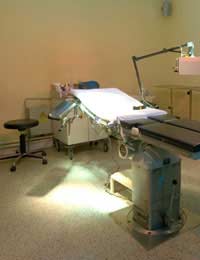Laser Eye Surgery

If you’re sick of wearing glasses or contact lenses, laser eye surgery may be a better option for you. It can help to correct the vision problems that require you to wear glasses or contact lenses in the first place. This is a permanent solution but as it’s a delicate operation, it’s not without its risks.
What does Laser Eye Surgery Involve?
A laser is used to alter the shape of the cornea, the covering of the iris and the lens of the eye. This is a permanent change, and the surgery is fairly complex as a result. Local anaesthetic drops are put in the eye to prepare for the procedure. After this, a flap is cut in the cornea and a hinge is left at the end of the flap. The flap is then folded back so that the middle of the cornea becomes visible. Laser pulses vaporise some of this and the flap is patched up.Can Laser Eye Surgery Help me?
Laser eye surgery can help to correct vision problems that involve the cornea, like short-sightedness, but it isn't a solution for age-related vision loss. This is mainly because age-related vision loss isn't related to the cornea, so reshaping it won't cure the problem.How Long Does the Procedure Last?
You will be admitted as an out-patient in most cases and the surgery takes around an hour. Each eye is usually operated on separately to limit the chances of both eyes becoming contaminated at the same time.What are the Risks Involved?
Luckily, complications aren't common. The Royal College of Ophthalmologists state that complications happen in 5% of patients. However, it's good to be aware of the possible risks so that you can go into the surgery with your eyes open (so to speak!).Some patients suffer from dry eyes for a few months after the procedure. Artificial tear supplements are used as a long-term solution to this. It's not uncommon for patients to experience 'halo' effects when driving at night. This is more likely if you've had more complicated surgery, but it's not a huge problem.
Occasionally, the eye wall may start to thin, which can change the shape of the eye. This can result is further loss of vision, but this is rare. If it does happen, more surgery to the cornea may be necessary, but hard contact lenses can have the same effect.
What Happens After the Procedure?
You're required to wear an eye patch over the eye that's been operated on for twenty-four hours after the procedure. For the vast majority of patients, recovery is straight-forward. Most of the time, you can return to work within a week, often within a few days of the procedure.If the procedure is complicated, you may be advised against driving for up to two weeks afterwards.
For the first few months after the procedure, you'll need to wear tinted glasses that offer UV protection when going out in the sun.
Laser eye surgery is a good way to correct vision problems if you’re looking for a permanent solution and no longer want to wear glasses or contact lenses. However, it is only suitable for correcting vision problems that stem from the cornea, which rules out loss of vision as a result of age.
- Buttock Implants: What is Involved?
- Face Lifts: What You Need to Know Before You Proceed
- Non Invasive Plastic Surgery
- Finding a Reputable Cosmetic Surgeon
- All About Cosmetic Dentistry Procedures
- Cosmetic Surgery Scams
- Rhinoplasty
- Liposuction
- Cosmetic Surgery: The Deterrent Discussion
- Introduction to Cosmetic Surgery
- Cosmetic Surgery: Contacts
- Breast Implants or Reduction
- Botox and Restylane


Re: Liposuction
I had it done last year in Prague, however the prices here in UK are crazy high. I had it done on few parts of my body so it was worth to travel- The…
Re: Cosmetic Surgery: The Deterrent Discussion
My mom has done her tummy tuck in Prague, Czech Republic. She was looking for good clinic but less expensive…
Re: Liposuction
A friend of mine has done the procedure but she had chosen Cracow, Poland. She is supersatisfied. The city is beautiful so she was also sightseeing a…
Re: Cosmetic Surgery: The Deterrent Discussion
I had my ba done in Cracow, Poland and I'm on cloud nine. It was perfect. The same standards for less money. I'm…
Re: Best Looks for Black Skin
I am looking for perfect make up for myself, I have a lot of oily skin
Re: Perfumes and Toxins: How Safe is Your Perfume?
I am gravely allergic to perfumes in detergents, toilettries, room deodorizers. Because of the toxins in…
Re: Best Looks for Mediterranean to Asian Skin
Dear Madam, I have always had problems wearing foundation as I have olive skin and I have tried powered…
Re: The Right Eye Shadow For Your Eye Colour
Isell makeup, what top brands do i sell for allergic eyes?
Re: Botox and Restylane
I wouldnt consider it if I were you; I had restylane in August and became poorly 3 hours after and still not right 11 weeks later - it…
Re: Cosmetic Surgery: The Deterrent Discussion
The recent scandal with the French breast implants stands as a powerful deterrent argument all by itself.…